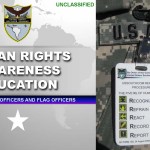
A central goal of U.S. foreign policy is promotion of respect for human rights, as embodied in the Universal Declaration of Human Rights. Human rights are freedoms, immunities, and benefits that are deemed universal, inherent, and inalienable possessions of all humankind. This means that human rights are not a concession granted by society or any particular government. Human Rights Law requires a nation to guarantee the fundamental human rights of its citizens throughout the peace-war-peace spectrum. The Law of War* is that part of international law that regulates the conduct of armed hostilities.
